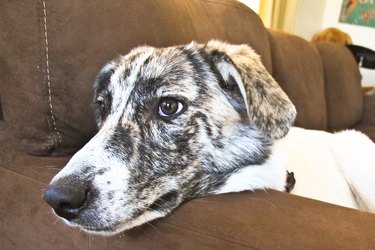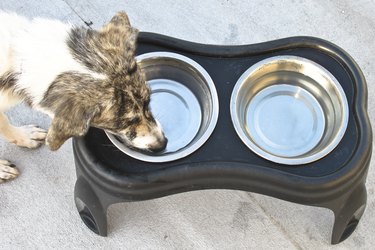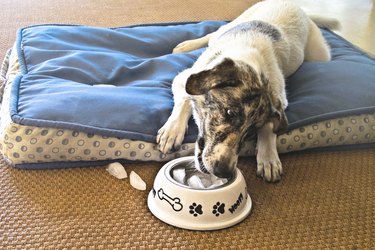How to Rehydrate a Sick Dog
We spoke with Dr. Shagufta Mulla, a veterinarian with a DVM degree from Colorado State University with 20 years of experience as a small animal veterinarian, to find out about dehydration and how to rehydrate a sick dog. "When dogs get sick, they can sweat through their paws, vomit, pant heavily, and develop diarrhea," Dr. Mulla says.
All of these can lead to dehydration, which causes a domino effect of other health problems. Your dog's body can also get dehydrated from playing too hard, especially in the sun, or from not drinking enough while indoors in a dry home. Knowing how to spot signs of dehydration and how to get your dog to start drinking enough water will help a dog owner avoid more serious problems and a trip to the veterinarian.
Video of the Day
Video of the Day

What is dehydration?
Dehydration is a lack of fluids in the body, with a lack of water to the muscles causing a variety of problems. In addition to muscle issues, dehydration affects your dog's cells. Cells perform myriad important functions. If they begin to dehydrate, this can interfere with everything from brain function to muscle use to decreased organ function to nerve problems.
Causes of a dehydrated dog
When dogs lose more fluids than they take in, there can be one main cause or a combination of reasons. Water exits the body though sweating, vomiting, panting, urinating, bleeding, or defecating, particularly through diarrhea. Causes can include overexertion, sickness, a dry home, and a lack of eating and drinking.
If your dog is taking a medication, that can also lead to dehydration. Ask your veterinarian if dehydration is one of the side effects of the medication. A dog's health problems, like diabetes or kidney disease, can also cause dehydration. Sometimes, dogs just don't drink water often enough. This can be the case on a hot day or if you and your pooch are enjoying outdoor activity and they don't have enough water throughout the day.

Signs and effects of dehydration in dogs
Look for one or more signs of dehydration to see if your dog might be dehydrated:
- Sweating on the paws
- Panting
- Dry mouth
- Dry nose
- Lethargy
- Vomiting
- Diarrhea
- Thick saliva
- Poor skin elasticity
Effects of dehydration on a pet's health may include:
- Cramping
- Nausea
- Decreased cell function
- Loss of appetite
- Lethargy
- Kidney stress
Long-term dehydration can be the result of more serious health issues, such as diabetes, kidney disease, and cancer.
Can you treat dehydrated dogs with liquids and electrolytes?
Water is the best hydration fluid, but in some cases, your pet might need more than that. That's because when your dog loses fluids, they lose important electrolytes that help with cell, muscle, organ, and brain function. Supplements, like electrolytes, can counter heat exhaustion and improve a pet's health much like humans use Gatorade. Important electrolytes for dogs include sodium, potassium, and chloride.
"Depending on why your dog is sick, rehydrating can be tricky because waiting for your dog to catch up on hydration through drinking may cause your pet's condition to worsen," says Dr. Mulla. "In some cases, your pet may not be able to rehydrate by drinking." Contact your veterinarian to see how serious your dog's dehydration is.
In some cases, you'll need to take them to the clinic to have the veterinarian administer intravenous fluids. "For mild cases, they may administer fluids beneath the skin s(ubcutaneously) to get your dog properly hydrated," says Dr. Mulla. In other cases, your veterinarian might recommend a commercial hydrating drink. Some human fluid replacement drinks, like Pedialyte, work well. "Make sure to use unflavored versions, as the flavored ones have artificial sweeteners," says Dr. Mulla. Your dog might do fine with a moist, nutrient-rich dog food as well.
You might think that giving your dog a salt tablet or adding salt to their water will help, but it might be too much with the sodium sitting in their stomach and absorbing incoming water, making it take longer to get into their bloodstream. It can also lead to sickness. Since dogs don't lose as much salt as humans, you can try making your own electrolyte drink with other ingredients.
Make a dog's water appealing
One way to keep dogs drinking is to make sure they have plenty of cool, clean water available. If you'll be gone long hours at work each day, consider buying a stainless steel bowl with a water fountain. The water will continue to circulate without dust collecting on the top. The noise will remind your dog that the bowl is there with fresh water and will attract them.
If you can't clean your dog's food bowl after each meal, clean it daily. If you don't have a circulating water bowl, clean it each night instead of just refilling it.

If you take your dog out during hot weather, bring cool water in a thermos. Look into buying a collapsible dog bowl that you can set down, pop up, and fill with water. Water bottles with a spout let water leave the bottle slower than through a completely open bottle, making it easier for your dog to lap up the escaping water. Some dogs enjoy crunching on ice cubes or frozen chicken broth on a hot day. Serving wet food rather than kibble is another way to increase water intake that is separate from your dog's water bowl.
The bottom line
Dehydration is a lack of fluids in the body stemming from your dog expelling more fluids than they take in. Dehydration can sometimes be caused by medication but is also caused by overexertion, sickness, or diarrhea. While water is the best hydration fluid, dogs can occasionally benefit from more electrolytes. Your veterinarian may recommend human fluid replacement drinks, like Pedialyte, or a change in your dog's diet to moist, nutrient-rich food.